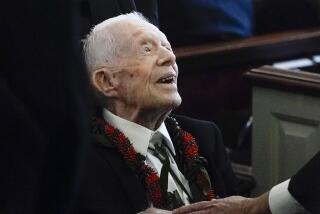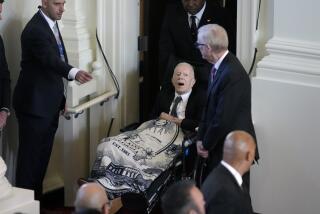Carter Praises Tsongas, but No Endorsement
PLAINS, Ga. — Jimmy Carter, who campaigned for President on the promise never to lie, on Saturday met and praised Paul E. Tsongas, the presidential candidate who has promised to tell the truth even if it hurts.
Although the former Massachusetts senator did not leave the former President’s hometown with an endorsement, Carter did deliver the next best thing--a host of kind words for Tsongas and implicit criticism of those Democratic presidential aspirants who, unlike Tsongas, are pushing a middle-class tax cut.
Carter’s jabs seemed aimed directly at Arkansas Gov. Bill Clinton, Tsongas’ main rival in the Democratic race, whose platform includes such a tax benefit.
“The more Democratic candidates yield to transient demagoguery like tax cuts--when we will probably be facing a $400-billion to $500-billion deficit this year--(the more it) is a step backward,” said Carter, standing with Tsongas outside his home.
Echoing Tsongas’ criticisms of a middle-class tax cut, Carter said, “It’s not a tax cut we want that gives us a dollar a day in relief. We want to have someone address the economic woes of our country in a nonpolitical and courageous fashion.”
Later Carter described it as a “cheap shot” for candidates to promise a tax cut in light of the deficit. “To me,” he said, “that’s ridiculous.”
The Tsongas campaign hopes that Carter’s praise will help persuade Georgia Democrats to take a closer look at the New Hampshire primary winner before this state’s primary on March 3--a contest in which Clinton is the heavy favorite.
Before leaving the South to campaign in Maine, Tsongas insisted he could make a respectable showing here despite criticism by Clinton backers that the Massachusetts native has little understanding of Southerners.
“I can take my message . . . anywhere,” Tsongas said. “This notion of economic truth has resonance.”
Carter, the last Democrat to win the White House, said he would not endorse a candidate before the Georgia primary. He did, however, suggest that Tsongas’ long-shot campaign bore a striking resemblance to his own.
“The beginnings were very similar. No one thought we had a chance,” he said.
And he said that the mood of the American public these days is reminiscent of what he encountered during his 1976 campaign in the wake of the Vietnam War and the Watergate scandal.
“I think there’s kind of a similar desire on the part of the American people now just to have a candidate tell them the truth and be honest.”
More to Read
Get the L.A. Times Politics newsletter
Deeply reported insights into legislation, politics and policy from Sacramento, Washington and beyond. In your inbox three times per week.
You may occasionally receive promotional content from the Los Angeles Times.











